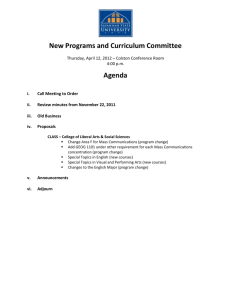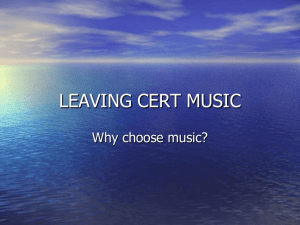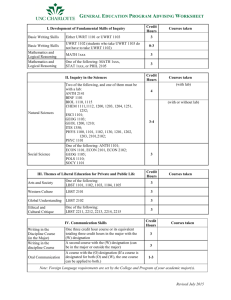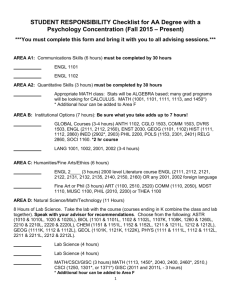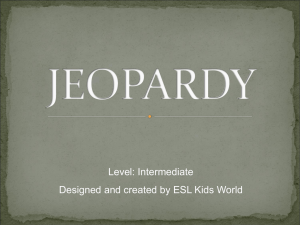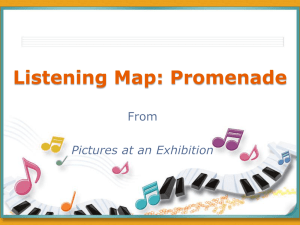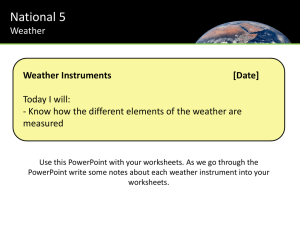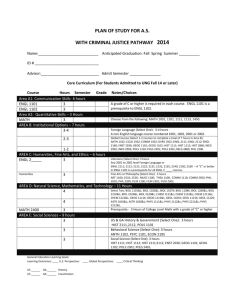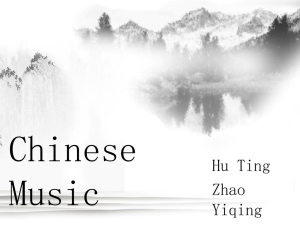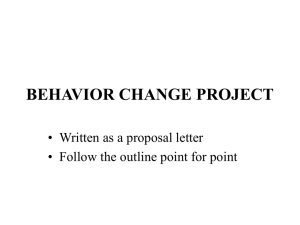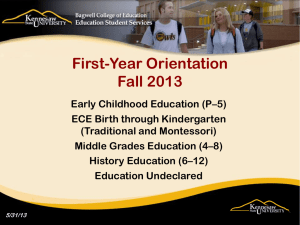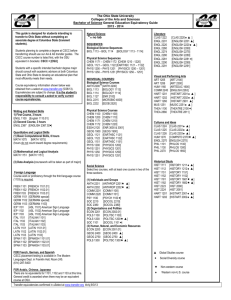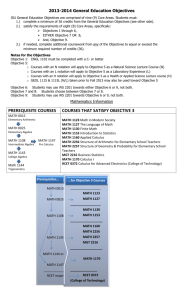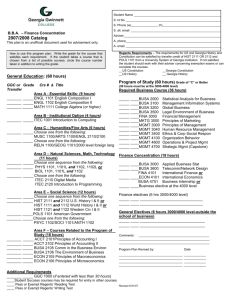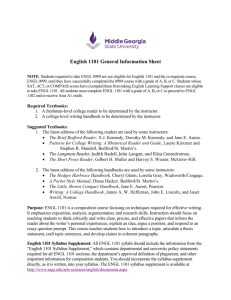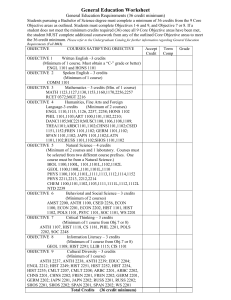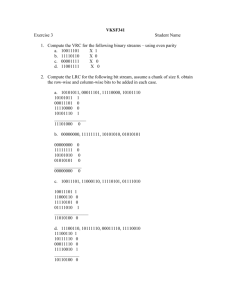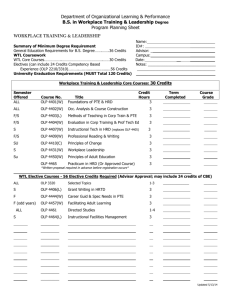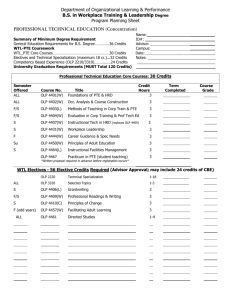KSU General Education Learning Outcomes Assessment: Faculty
advertisement
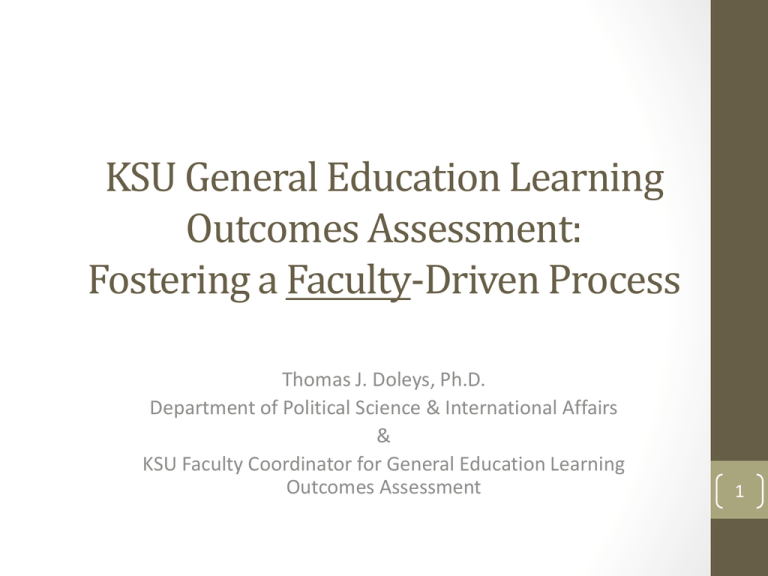
KSU General Education Learning Outcomes Assessment: Fostering a Faculty-Driven Process Thomas J. Doleys, Ph.D. Department of Political Science & International Affairs & KSU Faculty Coordinator for General Education Learning Outcomes Assessment 1 Why Assess General Education? • Because We Want To: • Are students learning what we (faculty) say we want them to learn? • We do it in our individual classes…why not for the programs of which the classes are a part? • After all, we have nine (9) faculty-approved General Education learning outcomes. [HERE & next slide] • Because We Have To: • University System of Georgia-mandated General Education Comprehensive Review (due 2015-16) • General Education Program Review for SACS Reaccreditation (due 2016-2017) 2 What Are We Assessing? General Education Learning Outcomes • Production of Written Communication: Students write appropriately for rhetorical situation, audience, purpose and genre; demonstrate appropriate content, organization, syntax, and style; and acknowledge the use of information sources, according to convention. • Reading Comprehension: Students articulate comprehension of written material including the author’s rhetorical purpose and the strategic use of text features. • Quantitative Representation: Students convert information into a mathematical portrayal (e.g., equations, graphs, diagrams, tables, or words) at a level appropriate for the complexity of problems in a college-level course • Quantitative Interpretation: Students explain information presented in mathematical forms (e.g., equations, graphs, diagrams, tables, or words) at a level appropriate for the complexity of problems in a college-level course. 3 • Social Sciences: Students analyze the complexity of human behavior and how social, historical, economic, political, or spatial relationships develop, persist, or change. • Natural Sciences: Students apply the scientific method to analyze data related to natural phenomena found in everyday life. • U.S. Perspectives: Students articulate the historical, political, social, or institutional developments of the United States. • Global Perspectives: Students analyze creative works from multiple international cultures in relation to the historical, political, economic, sociocultural, aesthetic, or personal contexts in which those works emerged. • Critical Thinking: Students articulate a position on a issue and support it by evaluating evidence relevant to the position, considering opposing positions or evidence, and documenting sources according to convention. 4 By What Process Assessment? • A Two-Year Assessment “Cycle” • Year #1: Design & Test • Year #2: Refine & Implement • Why Two Years? • Reduce burden on faculty • Provide adequate time to craft and administer quality instrument 5 2011-2013 • US Perspectives (POLS 1101) • Written Communication (ENGL 1101, ENGL 1102) • Reading Comprehension (ENGL 1101, ENGL 1102) 2012-2014 • Global Perspectives (ART/DANC/MUSI/TPS 1107) • Critical Thinking (COM 1109, FL 1002, PHIL 2200) • Social Science (COM 1109, FL 1002, PHIL 2200) 2013-2015 • Natural Sciences (SCI 1101, SCI 1102 & CHEM/PHYS/MATH) • Quantitative Representation (MATH 1101/1113) • Quantitative Interpretation (MATH 1101/1113) 6 Typical Two-Year Assessment Cycle YEAR 1: FALL YEAR 1: SPRING YEAR 2: FALL YEAR 2: SPRING •Operationalize learning outcome(s) •Identify/design appropriate assessment rubric & instrument(s) •Identify faculty volunteers to pilot instruments •Administer pilot assessment •Aggregate data and report outcomes •Review pilot data & refine instrument(s) •Recruit & train faculty to administer refined instrument(s) •Administer refined instrument(s) •Aggregate data and report outcomes 7 What Is My Role? • Faculty Coordinator for General Education Learning Outcomes Assessment (GELOA) • I’m Here to Help You Assess the Way You Believe is Most Appropriate for Your Discipline • Tasks & Responsibilities • Coordinate effort across Gen Ed disciplines • Liaise with Disciplinary Area Coordinators (DACs) • Provide information, advice and assistance • Represent and advocate for faculty • Oversee graduate student assessment fellows • Aggregate/analyze data & write reports 8 Discipline Area Coordinators (DACs) • (S)elected by Gen Ed departments • Tasks & Responsibilities • Work with discipline faculty to operationalize learning outcome(s) appropriate to discipline • Help develop, refine and revise assessment instrument(s) • Train faculty in use of instrument 9 Other Resources • Faculty Compensation • Propose financial incentive to encourage faculty to participate in Year #2 assessment • Up to 50 faculty per assessment cycle • Graduate Student Assistants • Alternative to faculty evaluation of assessment instrument • Not appropriate for every instrument 10 “le mieux est l’ennemi du bien” (the best is the enemy of the good) - Voltaire Be intentional… …but, for goodness sake, be realistic. 11 No Need to Reinvent the Wheel • I’m here to help you identify rubrics/instruments that are already in use • Example: AAC&U Valid Assessment of Learning in Undergraduate Education (VALUE) Rubrics [HERE] • Written Communication • Oral Communication • Reading • Quantitative Literacy • Information Literacy • Critical Thinking 12 Eleven (11) Assessment Methods (Tebo-Messina & Prus 1995) 1) 2) 3) 4) 5) 6) 7) 8) 9) 10) 11) Commercial Standardized Exams Locally-Developed Exams/Instruments Simulation or Performance Appraisals Written Surveys and Questionnaires Interviews and Focus Groups External Examiners Archival Records and Transcript Analysis Portfolios Behavioral Observations Student Self-Evaluations Classroom Research 13 Very Important Things to Remember • Assessment data will NOT be linked to specific course sections • Assessment data will NOT be used to evaluate individual faculty performance • This is about measuring student learning across the General Education curriculum…it is NOT about judging individual faculty or courses. 14 Questions? Comments? Concerns? 15
